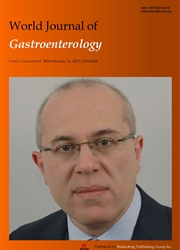

 中文摘要:
中文摘要:
AIM: To investigate the association between serum alpha-fetoprotein(AfP) levels and fatty liver disease(fLD) in a Chinese population.METHODS: A cross-sectional study was performed among subjects who presented for a health examination at the First Affiliated Hospital, College of Medicine, Zhejiang University in 2013. fLD was diagnosed based onan ultrasonography examination. Serum AfP levels were measured with a chemiluminescence immunoassay.RESULTS: Of the 9800 subjects enrolled, 2601 were diagnosed with fLD. Subjects with fLD had higher serum AfP levels than those without the disease. Subjects with high serum AfP levels had a higher prevalence of fLD, metabolic syndrome, and its components. Univariate logistic analysis showed that elevated serum AfP levels were associated with an increased risk of fLD(OR = 1.057, 95%CI: 1.031-1.084). however, after adjusting for covariates, AFP no longer remained significantly associated with the risk factors for fLD. CONCLUSION: Our results suggest that serum AfP levels are significantly associated with fLD and that AfP acts as a cofactor, but not as an independent factor, for fLD.
 英文摘要:
英文摘要:
AIM: To investigate the association between serum alpha-fetoprotein (AFP) levels and fatty liver disease (FLD) in a Chinese population.
 同期刊论文项目
同期刊论文项目
 同项目期刊论文
同项目期刊论文
 Effect of miR-34a in regulating steatosis by targeting PPARalpha expression in nonalcoholic fatty li
Effect of miR-34a in regulating steatosis by targeting PPARalpha expression in nonalcoholic fatty li Serum periostin is a potential biomarker for non-alcoholic fatty liver disease: a case-control study
Serum periostin is a potential biomarker for non-alcoholic fatty liver disease: a case-control study Independent association of HbA1c and nonalcoholic fatty liver disease in an elderly Chinese populati
Independent association of HbA1c and nonalcoholic fatty liver disease in an elderly Chinese populati Impact of subclinical hypothyroidism on the development of non-alcoholic fatty liver disease: A pros
Impact of subclinical hypothyroidism on the development of non-alcoholic fatty liver disease: A pros Association between serum growth hormone levels and nonalcoholic fatty liver disease: a cross-sectio
Association between serum growth hormone levels and nonalcoholic fatty liver disease: a cross-sectio Prevalence and risk factors for the development of nonalcoholic fatty liver disease in a nonobese Ch
Prevalence and risk factors for the development of nonalcoholic fatty liver disease in a nonobese Ch 期刊信息
期刊信息
